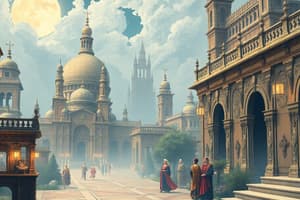Podcast
Questions and Answers
What characterizes the Prehistoric Era?
What characterizes the Prehistoric Era?
- Time before written records (correct)
- Invention of the wheel
- Rise of major civilizations
- Development of writing systems
Which of the following civilizations is associated with Ancient History?
Which of the following civilizations is associated with Ancient History?
- Ancient China (correct)
- The Ottoman Empire
- The Inca Empire
- The Byzantine Empire
What major development occurred during Medieval History?
What major development occurred during Medieval History?
- The Age of Enlightenment
- The Industrial Revolution
- The emergence of writing systems
- Cultural developments like Gothic architecture (correct)
Which period marks the beginning of the Scientific Revolution?
Which period marks the beginning of the Scientific Revolution?
Which historical figure is known for his work on the Peloponnesian War?
Which historical figure is known for his work on the Peloponnesian War?
What impact did World War II have on global politics?
What impact did World War II have on global politics?
What is the focus of social history?
What is the focus of social history?
Which of the following best defines historiography?
Which of the following best defines historiography?
Flashcards are hidden until you start studying
Study Notes
Overview of History
- Definition: Study of past events, societies, and civilizations.
- Branches of History:
- Ancient History
- Medieval History
- Modern History
- Contemporary History
Key Periods in History
-
Prehistoric Era
- Time before written records.
- Characterized by the development of early human cultures.
-
Ancient History (circa 3000 BCE - 500 CE)
- Emergence of writing systems (e.g., cuneiform, hieroglyphs).
- Significant civilizations: Mesopotamia, Ancient Egypt, Indus Valley, Ancient China, Mesoamerica.
-
Medieval History (500 - 1500 CE)
- Fall of the Roman Empire leads to the Middle Ages.
- Feudalism and the rise of monarchies.
- Cultural developments: Gothic architecture, the Crusades.
-
Modern History (1500 - 1800 CE)
- Age of Exploration and colonization.
- Scientific Revolution and the Enlightenment.
- The American and French Revolutions.
-
Contemporary History (1800 - Present)
- Industrial Revolution and technological advancements.
- World Wars and their impact.
- Cold War and globalization.
Major Themes in History
- Political History: Study of governments, leaders, and political movements.
- Economic History: Examination of economic systems, trade, and industry.
- Social History: Focus on societal structures, classes, and daily life.
- Cultural History: Analysis of art, religion, and intellectual movements.
- Military History: Exploration of warfare, strategies, and conflicts.
Historical Methods
- Primary Sources: Original documents, artifacts, and eyewitness accounts.
- Secondary Sources: Analyses and interpretations of primary sources.
- Historiography: Study of how history has been written and interpreted over time.
Important Historical Figures
- Herodotus: Often called the "Father of History."
- Thucydides: Known for his work on the Peloponnesian War.
- Karl Marx: Influential in social and economic history.
- Martin Luther King Jr.: Key figure in civil rights history.
Notable Historical Events
- Fall of Constantinople (1453): Marks the end of the Middle Ages.
- American Revolution (1775-1783): Establishes the United States.
- World War I (1914-1918): Global conflict reshaping nations.
- World War II (1939-1945): Major global conflict leading to the United Nations' formation.
Importance of Studying History
- Understanding cultural heritage and identity.
- Learning from past mistakes to inform future decisions.
- Developing critical thinking and analytical skills.
Overview of History
- History involves the study of past events, societies, and civilizations.
- It has several branches, including Ancient, Medieval, Modern, and Contemporary History.
Key Periods in History
- Prehistoric Era: Time period characterized by early human cultures before written records.
- Ancient History (circa 3000 BCE - 500 CE): Notable for the emergence of writing systems such as cuneiform and hieroglyphs and significant civilizations like Mesopotamia, Ancient Egypt, Indus Valley, Ancient China, and Mesoamerica.
- Medieval History (500 - 1500 CE): Follows the fall of the Roman Empire, marked by feudalism, the rise of monarchies, and cultural developments like Gothic architecture and the Crusades.
- Modern History (1500 - 1800 CE): Defined by the Age of Exploration, colonization, the Scientific Revolution, Enlightenment thinking, and revolutions in America and France.
- Contemporary History (1800 - Present): Characterized by the Industrial Revolution, technological advancements, global conflicts like World Wars, and the Cold War's influence on globalization.
Major Themes in History
- Political History: Investigates governments, leaders, and political movements.
- Economic History: Examines economic systems, trade, and industrial growth.
- Social History: Focuses on societal structures, class systems, and everyday life.
- Cultural History: Analyzes the impacts of art, religion, and intellectual trends.
- Military History: Explores warfare tactics, strategies, and major conflicts.
Historical Methods
- Primary Sources: Include original documents, artifacts, and firsthand accounts of events.
- Secondary Sources: Feature analyses and interpretations based on primary sources.
- Historiography: Studies how historical narratives are constructed and interpreted over time.
Important Historical Figures
- Herodotus: Regarded as the "Father of History" for his narrative style.
- Thucydides: Renowned for his meticulous account of the Peloponnesian War.
- Karl Marx: Significant for his contributions to social and economic theory.
- Martin Luther King Jr.: Central figure in the American civil rights movement.
Notable Historical Events
- Fall of Constantinople (1453): Marked the conclusion of the Middle Ages and significant geopolitical shifts.
- American Revolution (1775-1783): Resulted in the establishment of the United States as an independent nation.
- World War I (1914-1918): A global conflict that dramatically altered national boundaries and political landscapes.
- World War II (1939-1945): Led to widespread destruction and the subsequent establishment of the United Nations.
Importance of Studying History
- Aids in understanding cultural heritage and individual identity.
- Provides lessons from historical mistakes to shape future decision-making.
- Enhances critical thinking and analytical skills through the evaluation of past events.
Studying That Suits You
Use AI to generate personalized quizzes and flashcards to suit your learning preferences.




